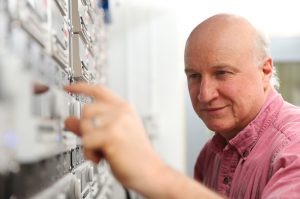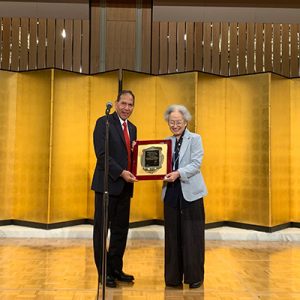 In September 2019, at the 16th International Symposium on Solid Oxide Fuel Cells (SOFC-XVI), Symposium Chair Subhash Singhal presented a plaque from The Electrochemical Society (ECS) to Yukiko Dokiya, the widow of Professor Masayuki Dokiya. Also present were daughter Fumiko Dokiya, her husband Hironobu Dokiya, and their daughter Yoko Dokiya and son Masahiro Dokiya. The plaque thanked the Dokiya family for their generous contribution in Masayuki’s memory. The gift made possible the creation of the Dokiya Fund of The Electrochemical Society in 2004. From 2004 to 2019, the Fund provided financial travel assistance to 128 Dokiya Fund Travel Grant Recipients to attend ECS and other related meetings around the world in their pursuit of electrochemical science and technology to benefit mankind. (more…)
In September 2019, at the 16th International Symposium on Solid Oxide Fuel Cells (SOFC-XVI), Symposium Chair Subhash Singhal presented a plaque from The Electrochemical Society (ECS) to Yukiko Dokiya, the widow of Professor Masayuki Dokiya. Also present were daughter Fumiko Dokiya, her husband Hironobu Dokiya, and their daughter Yoko Dokiya and son Masahiro Dokiya. The plaque thanked the Dokiya family for their generous contribution in Masayuki’s memory. The gift made possible the creation of the Dokiya Fund of The Electrochemical Society in 2004. From 2004 to 2019, the Fund provided financial travel assistance to 128 Dokiya Fund Travel Grant Recipients to attend ECS and other related meetings around the world in their pursuit of electrochemical science and technology to benefit mankind. (more…)
 As ECS celebrates the 40-year-anniversary of its first female president, Joan Berkowitz, it is important to note that ECS has a tradition of showcasing women in the sciences at its meetings. Carol A. Bessel, acting division director at the National Science Foundation (NSF), was the highlighted speaker at the annual business meeting at the 235th ECS Meeting. Valerie Browning, director of the Defense Advances Research Projects Agency (DARPA)’s Defense Sciences Office (DSO), will deliver the ECS Lecture at the plenary session of the 236th ECS Meeting. If including, recognizing, and hearing women is critical to attracting and retaining talented women in the sciences, then Bessel and Browning are shining examples of women leading the way. (more…)
As ECS celebrates the 40-year-anniversary of its first female president, Joan Berkowitz, it is important to note that ECS has a tradition of showcasing women in the sciences at its meetings. Carol A. Bessel, acting division director at the National Science Foundation (NSF), was the highlighted speaker at the annual business meeting at the 235th ECS Meeting. Valerie Browning, director of the Defense Advances Research Projects Agency (DARPA)’s Defense Sciences Office (DSO), will deliver the ECS Lecture at the plenary session of the 236th ECS Meeting. If including, recognizing, and hearing women is critical to attracting and retaining talented women in the sciences, then Bessel and Browning are shining examples of women leading the way. (more…)
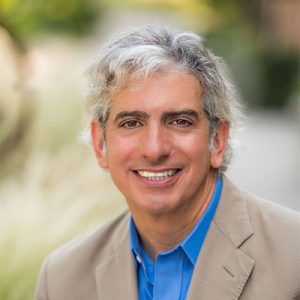 Christopher Jannuzzi, Executive Director and CEO of The Electrochemical Society (ECS), is featured in SciTech Europa Quarterly, a digital publication bringing together the key voices in the European scientific community and the leading trends in science, research and innovation. Jannuzzi describes the distinguished history of ECS, which was founded in 1902 and has grown to a society with over 8,000 members in 80 countries. The core mission remains the same: to advance theory and practice at the forefront of electrochemical and solid state science and technology, and allied subjects. However, with 13 electrochemistry and solid state science and technology divisions, the application—and vital significance—of electrochemistry has grown exponentially. The research published in ECS journals is of huge importance to the future of our planet. ECS makes it freely available to all readers—and free for authors to publish—through a bold and exciting open access initiative, “Free the Science.” Read the full article in SciTech Europa Quarterly now.
Christopher Jannuzzi, Executive Director and CEO of The Electrochemical Society (ECS), is featured in SciTech Europa Quarterly, a digital publication bringing together the key voices in the European scientific community and the leading trends in science, research and innovation. Jannuzzi describes the distinguished history of ECS, which was founded in 1902 and has grown to a society with over 8,000 members in 80 countries. The core mission remains the same: to advance theory and practice at the forefront of electrochemical and solid state science and technology, and allied subjects. However, with 13 electrochemistry and solid state science and technology divisions, the application—and vital significance—of electrochemistry has grown exponentially. The research published in ECS journals is of huge importance to the future of our planet. ECS makes it freely available to all readers—and free for authors to publish—through a bold and exciting open access initiative, “Free the Science.” Read the full article in SciTech Europa Quarterly now.
Dahn Unveils Million Mile Battery in Ground-breaking Article
Posted on September 25, 2019 by Frances Chaves Elon Musk promised—and Jeff Dahn delivered! With the publishing of a ground-breaking paper in the Journal of The Electrochemical Society (JES), Dahn announced to the world that Tesla may soon have a battery that makes their robot taxis and long-haul electric trucks viable. Dahn and his research group is Tesla’s battery research partner. Dahn says “… that cells of this type should be able to power an electric vehicle for over one million miles and last at least two decades in grid energy storage.”
Elon Musk promised—and Jeff Dahn delivered! With the publishing of a ground-breaking paper in the Journal of The Electrochemical Society (JES), Dahn announced to the world that Tesla may soon have a battery that makes their robot taxis and long-haul electric trucks viable. Dahn and his research group is Tesla’s battery research partner. Dahn says “… that cells of this type should be able to power an electric vehicle for over one million miles and last at least two decades in grid energy storage.”
According to Doron Aurbach, JES batteries and energy storage technical editor, “This comprehensive article is expected to be impactful in the field of batteries and energy storage. It is a very systematic study by one of the most renowned and prestigious electrochemistry groups in the world. It was a pleasure for me as a technical editor to handle this paper. It substantiates all the statements about the truly high quality and importance of JES, one of the leading and most prestigious journals in electrochemistry. JES provides an excellent service to the global electrochemistry community—and thousands of ECS members—regardless of ‘impact factors.’” As of today, Dahn’s JES article has received over 31,563 abstract views, over 17,000 articles downloads, and quotes in news outlets around the world. (more…)
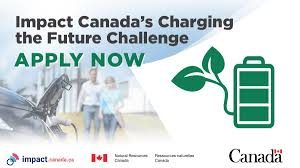 Impact Canada is working on a $4.5-million project known as the Charging the Future Challenge. The goal is to accelerate made-in-Canada battery innovation, build a clean energy future, and provide economic growth in Canada. The 18-month challenge offers five finalists the opportunity to pitch their ideas for battery breakthroughs to a jury for a chance to win up to $700,000 each to develop battery prototypes, with the winner receiving a $1 million grand prize. (more…)
Impact Canada is working on a $4.5-million project known as the Charging the Future Challenge. The goal is to accelerate made-in-Canada battery innovation, build a clean energy future, and provide economic growth in Canada. The 18-month challenge offers five finalists the opportunity to pitch their ideas for battery breakthroughs to a jury for a chance to win up to $700,000 each to develop battery prototypes, with the winner receiving a $1 million grand prize. (more…)
Million-Mile Battery to Revolutionize Electric Vehicles
Posted on September 10, 2019 by Frances ChavesMore efficient, longer-lasting batteries are needed to ensure the future of the electric vehicle market. Thanks to Jeff R. Dahn and his Dalhousie University research team, a “million-mile battery” may soon be a reality. Dahn is Tesla’s battery research partner. In “A Wide Range of Testing Results on an Excellent Lithium-Ion Cell Chemistry to be used as Benchmarks for New Battery Technologies,” Dahn describes a new Li-ion battery cell with a single crystal NMC cathode and an advanced electrolyte. The new battery should power an electric vehicle for one million miles and last at least 20 years in grid energy storage—making Tesla’s electric-powered semi-autonomous driving cars and trucks viable.
Attend the ECS Detroit Section’s Next Meeting on September 12!
Posted on September 5, 2019 by Frances ChavesECS’s Detroit Section is proud to present guest speaker Naoki Ota at its September section meeting. He will speak on:
“Lithium-Ion Batteries: Semi-Solid Electrode Technology—Next Generation Product / Manufacturing Platform for Lithium Ion”
Naoki Ota
President and CTO
24M Technologies, Inc.
Cambridge, Massachusetts 02139, USA (more…)
 Energy storage is crucial for the successful transition to renewable energy. Yet lithium-ion batteries have major limitations. Demand for lithium has increased exponentially, but production has not kept pace. Extracting lithium by brine mining is a long, costly, energy-intensive, and dangerous process with significant environmental impact. Access is difficult as most lithium mines are in South America.
Energy storage is crucial for the successful transition to renewable energy. Yet lithium-ion batteries have major limitations. Demand for lithium has increased exponentially, but production has not kept pace. Extracting lithium by brine mining is a long, costly, energy-intensive, and dangerous process with significant environmental impact. Access is difficult as most lithium mines are in South America.
Researchers at the Indian Institute of Technology (IIT) Madras developed a rechargeable iron ion battery to replace lithium. It uses mild steel as the anode and can store a high amount of energy. The iron battery withstood 150 cycles of charging and discharging under controlled conditions. After 50 cycles, the battery had 54 percent capacity retention. (more…)
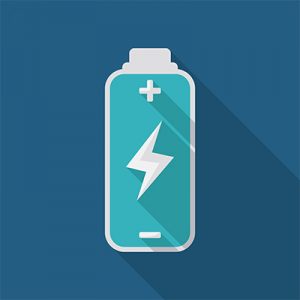 Canada is looking for its next big battery breakthrough!
Canada is looking for its next big battery breakthrough!
ECS Battery Division Member Presents at International Battery Event
Posted on March 21, 2019 by Jennifer QuartararoUniversity of Calgary Chemistry Professor Venkataraman Thangadurai’s background in solid-state batteries, solid oxide fuel cells, proton conducting SOFCs, and gas sensors have made him a source for information over the years. Because of this, the longtime ECS and battery division member has been invited to present several presentations this spring.
International Battery Event
This March, Thangadurai will speak at the International Battery Seminar & Exhibit taking place in Fort Lauderdale, Florida. The annual event showcases state of the art energy storage technology developments for consumer, automotive, military, and industrial applications, as well as offer attendees insights from guest speakers sharing their thoughts on significant material advancements, product development, manufacturing, and application of battery systems and enabling technologies.
ECS Biannual Meetings
Similar to the International Battery Seminar & Exhibit, ECS hosts biannual meetings on a broader scale, including a diverse number of topics in the electrochemical, solid state science, and technology field, of which Thangadurai has been a recurring speaker of.
In 2018, he attended AiMES as an invited guest speaker presenting his work, “Chemical and Electrochemical Stability of Fast Lithium Ion Conducting Garnet-Type Metal Oxides in H2o, Aqueous Solution, CO2, Li and S,” available in ECS Meeting Abstracts.


